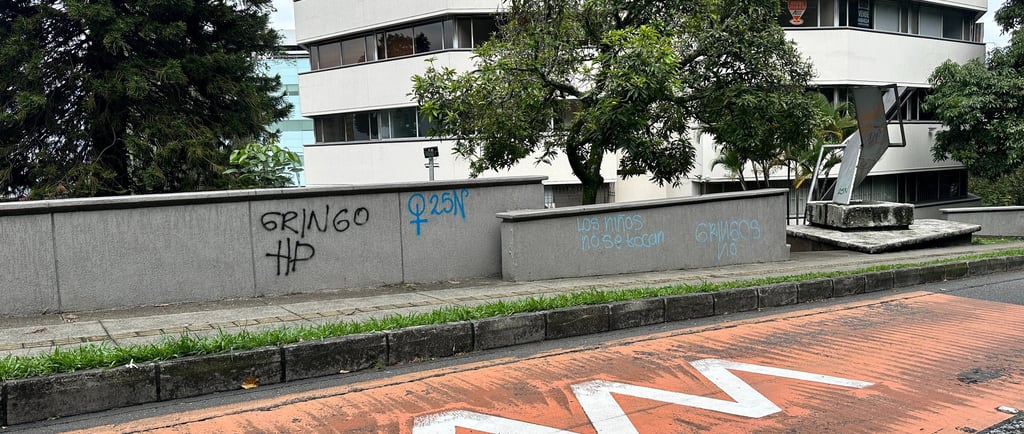Subscribe to our youtube channel today! @medellin_unfiltered
The United States Has A Massive Vice Issue.
The United States has a vice crisis. Colombia also has a massive vice issue - the Colombian issue is money, the U.S. vice issue runs much deeper, but these two vices are meeting at a crossroads. Which begs the question, is Medellin the new Tijuana?
OP-ED
Steve Hamilton
2/16/20254 min read


Today, I was walking the famed "Ciclovia" down Avenida Poblado, with a friend of mine from the U.K. who makes me think a lot more than most people do. He's a bit older than me, so I genuinely appreciate his wisdom and world view. in the 14km walk, we had adequate time to discuss the latest issues with Medellin and the tourists that are coming in. We were greeted by very large grafiti that read "Mata Gringo HP - 25N" and later in the walk there was one that read "Ves un gringo, matas a un gringo". The first one is saying "Kill Gringo hijueputa (motherfuckers, or SOB). The other read "See a gringo, kill a gringo". I know that sounds ominous, but let's be honest, that's a coward writing that. If someone had the courage and chutzpah to back it up, they'd say it with their whole chest out in public.
Here's the thing, in 2024, Colombia welcomed approximately 6.7 million tourists (source: elpais.com), with Medellín playing a significant role in this influx. Notably, around 1.2 million of these visitors were from the United States, underscoring the city's growing appeal to American travelers.
This surge in tourism has undeniably bolstered the local economy, infusing it with substantial foreign capital. However, beneath the surface of economic prosperity lies a complex and often contentious dynamic. Many locals grapple with mixed feelings about the influx of foreigners, particularly those drawn by the city's notorious associations with vices such as sex tourism, drug use, and the lingering shadow of Pablo Escobar.
The Shadows of The Past
The allure of Medellín for some tourists is not its rich cultural heritage or breathtaking landscapes but rather the pursuit of illicit pleasures. Social media platforms are replete with content that sensationalizes the city's nightlife, often reducing the identity of paisa women to mere objects of desire. Trends showcasing women using terms like "papasito" in a flirtatious manner have become pervasive, creating a distorted image that many find appealing—until it reveals a manipulative underside. This commodification not only misrepresents the true essence of Medellín's culture but also fosters a transactional view of human interactions.
The prevalence of content glorifying drug use and hedonistic partying further perpetuates a misguided narrative. Young men, often seeking an escape from personal struggles, are enticed by the false promise of becoming a "baller for a weekend," indulging in excesses that they believe are celebrated locally. This misconception not only endangers the individuals involved but also tarnishes the city's reputation, overshadowing its genuine cultural and historical offerings.
The economic benefits brought by tourism are substantial. In 2024, international tourism generated approximately $4.77 billion in revenue for Colombia during the first half of the year (source: colombiaone.com). Medellín, as a major tourist hub, has seen its share of this prosperity, with local businesses thriving and employment opportunities increasing. Yet, this financial boon comes with societal costs.
"Gringo HP - Ver Gringo, Mata Gringo HP"
The presence of tourists primarily seeking vice-related experiences has led to a range of social issues. Incidents such as the tragic case of John Poulos, accused of murdering a local DJ, and Timothy Allen Livingston's attempt to exploit underage girls in 2024, have exacerbated tensions between locals and foreign visitors. These events have ignited a surge of xenophobia, with some residents expressing disdain for "gringos" who they perceive as exploiting their city and its people.
However, it's essential to approach this situation with empathy and a nuanced perspective. While the actions of a subset of tourists are reprehensible, not all visitors come with ill intentions. Many are genuinely interested in engaging with the local culture, learning from it, and contributing positively beyond mere financial transactions.
Conversely, the local community must reflect on the systemic issues that allow such exploitative tourism to flourish. The commodification of culture and people, often driven by economic necessity, plays a role in perpetuating these cycles. Addressing these challenges requires a collective effort to redefine the city's global image, focusing on its rich heritage, innovation, and the resilience of its people.
Changing the Paradigm
Promoting alternative forms of tourism, such as medical tourism, offers a pathway to more sustainable and respectful interactions. Medellín has become a destination for high-quality, affordable medical procedures, attracting visitors who contribute positively to the local economy without perpetuating harmful stereotypes or behaviors. Highlighting these aspects can help shift the narrative, showcasing the city's advancements and the genuine warmth of its community.
Let's Build That Bridge
I feel like I said this a year ago, but it didn't seem to stick. The relationship between Medellín and its foreign visitors is multifaceted, marked by both mutual benefit and significant challenges. Fostering empathy on both sides is critical. Tourists must recognize that their actions have profound impacts on the communities they visit, extending beyond economic contributions. Engaging authentically with the local culture, respecting its people, and moving beyond superficial indulgences can lead to more meaningful and enriching experiences for all parties involved.
For the residents of Medellín, while it's natural to feel protective of one's home and culture, it's also important to distinguish between those who seek to exploit and those who come with genuine respect and curiosity. Building bridges through cultural exchange, education, and open dialogue can help mitigate xenophobia and foster a more inclusive environment.
Ultimately, Medellín's true beauty lies in its resilience, diversity, and the spirit of its people. By embracing these qualities and encouraging tourism that honors them, the city can continue to thrive, offering authentic experiences that enrich both visitors and locals alike.
Medellin Unfiltered
Discover the real Medellin, without filters.
CONTACT US
info@medellinunfiltered.com
© 2024 GWM Ventures. All rights reserved.
LEGAL




